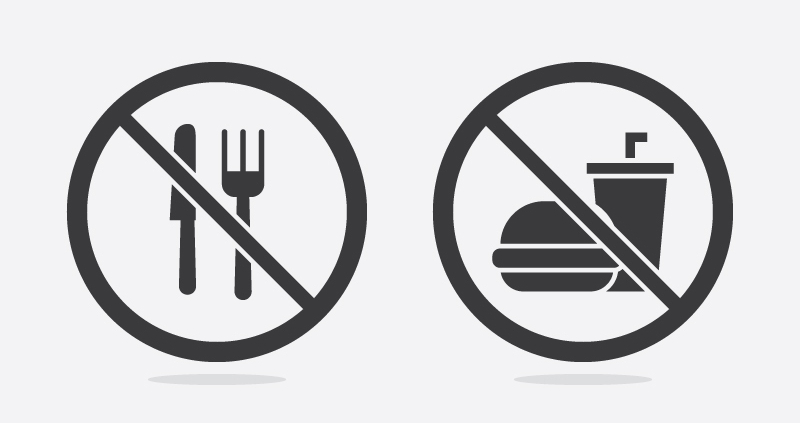Can I Eat in Public in Ramadan When I Am Excused to Not Fast?
Hanafi Fiqh
Answered by Ustadh Salman Younas
Question
- What is the rule of eating in public during the month of Ramadan for people who are exempted from fasting?
- Should one’s non-Muslim parents decide for the family to have a family lunch out, should their child (Muslim exempted from fasting) accept?
Answer
1. There are some details to this, but generally speaking, some scholars have stated that it is permitted for those with valid excuses not to fast to eat in public. Yet, others have opined that they should not eat in public.
Many of those who stated one should not eat in public did so to protect the individual from judgment of sin and disobedience. This is why some scholars stated that if the excuse is apparent, such as illness or old age, it is permitted to eat in public, while if non-apparent, then one should not. This indicates that according to these scholars, eating openly in the presence of non-Muslims would not be a problem, and nor would it be so around those who recognize that one has an excuse.
2. There is no harm in accepting such an invitation. If your refusal would annoy them, you should accept it in light of what you have mentioned regarding obedience and respect for parents.
[Fatawa al-Hindiyya; al-Mardawi, al-Insaf; Illish, Minh al-Jalil]
في الفتاوى الهندية: وَأَجْمَعُوا عَلَى أَنَّهُ لَا يَجِبُ التَّشَبُّهُ بِالصَّائِمِ عَلَى الْحَائِضِ وَالنُّفَسَاءِ وَالْمَرِيضِ وَالْمُسَافِرِ كَذَا فِي الْخُلَاصَةِ وَهَلْ تَأْكُلُ الْحَائِضُ سِرًّا أَوْ جَهْرًا قِيلَ سِرًّا وَقِيلَ جَهْرًا وَلِلْمُسَافِرِ وَالْمَرِيضِ الْأَكْلُ جَهْرًا رِوَايَةً وَاحِدَةً كَذَا فِي السِّرَاجِ الْوَهَّاجِ
في منح الجليل شرح مختصر خليل:( وَلَا يُفْطِرُ ) بِضَمِّ الْمُثَنَّاةِ وَكَسْرِ الطَّاءِ الْمُهْمَلَةِ بِأَكْلٍ أَوْ شُرْبٍ أَوْ جِمَاعٍ شَخْصٌ ( مُنْفَرِدٌ بِ ) رُؤْيَةِ هِلَالِ ( شَوَّالٍ ) إنْ خَافَ ظُهُورَ فِطْرِهِ لِلنَّاسِ بَلْ ( وَلَوْ أَمِنَ الظُّهُورَ ) أَيْ تَحَقَّقَ عَدَمُ ظُهُورِ فِطْرِهِ لِلنَّاسِ خَوْفًا مِنْ تَخَلُّفِ تَحَقُّقِهِ وَظُهُورِ أَمْرِهِ فَيُفَسَّقُ وَيُؤَدَّبُ وَحِفْظُ الْعِرْضِ وَاجِبٌ كَالنَّفْسِ ، وَيَجِبُ فِطْرُهُ بِالنِّيَّةِ وَلَا يُخْبِرُ بِهِ أَحَدًا ; لِأَنَّهُ يَوْمَ عِيدٍ . فَإِنْ أَفْطَرَ ظَاهِرًا وُعِظَ وَشُدِّدَ عَلَيْهِ فِيهِ إنْ كَانَ ظَاهِرًا لِصَلَاحٍ وَإِلَّا أُدِّبَ ، وَيَحْرُمُ فِطْرُ الْمُنْفَرِدِ ظَاهِرًا فِي كُلِّ حَالٍ ( إلَّا ) حَالَ كَوْنِهِ مُتَلَبِّسًا ( بِ ) أَمْرٍ ( مُبِيحٍ ) لِلْفِطْرِ فِي الظَّاهِرِ كَسَفَرٍ وَمَرَضٍ وَحَيْضٍ فَلَا يَحْرُمُ فِطْرُهُ ظَاهِرًا لِأَمْنِهِ عَلَى عِرْضِهِ بِمُلَابَسَةِ مُبِيحِهِ
قَالَ في الإنصاف: قَالَ الْقَاضِي يُنْكَرُ عَلَى مَنْ أَكَلَ فِي رَمَضَانَ ظَاهِرًا ، وَإِنْ كَانَ هُنَاكَ عُذْرٌ قَالَ فِي الْفُرُوعِ فَظَاهِرُهُ الْمَنْعُ مُطْلَقًا ، وَقِيلَ لِابْنِ عَقِيلٍ يَجِبُ مَنْعُ مُسَافِرٍ وَمَرِيضٍ وَحَائِضٍ مِنْ الْفِطْرِ ظَاهِرًا لِئَلَّا يُتَّهَمَ فَقَالَ إنْ كَانَتْ أَعْذَارًا خَفِيَّةً يُمْنَعُ مِنْ إظْهَارِهِ ، كَمَرِيضٍ لَا أَمَارَةَ لَهُ ، وَمُسَافِرٍ لَا عَلَامَةَ عَلَيْهِ
[Ustadh] Salman Younas
Checked and approved by Shaykh Faraz Rabbani
Ustadh Salman Younas graduated from Stony Brook University with a degree in Political Science and Religious Studies. After studying the Islamic sciences online and with local scholars in New York, Ustadh Salman moved to Amman where he spent five years studying Islamic law, legal methodology, belief, hadith methodology, logic, Arabic, and tafsir. He is currently a PhD candidate at the University of Oxford and continues his traditional studies with scholars in the United Kingdom.
